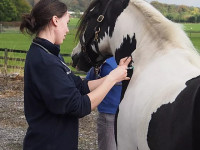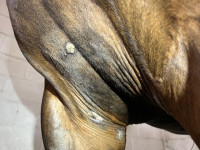Below are our latest entries on our blog - which our vets have put together to give you summaries on some equine health conditions, as well as some posts giving you information such as what happens in our days!

As many of you are aware, atypical myopathy is a deadly disease with devastating consequences for both the horse and the owner. Atypical myopathy in horses occurs when components, usually seeds or shoots, of the sycamore tree (Acer pseudoplatanus) are…

Do you know your flu vaccination rules for competitions? Lots have changed recently, and different organisations have rules that do not match. In some cases some venues have different rules too! I’ve put together a list of organisations and their…

Sarcoids are types of tumour which occur in the skin. They are the most common type of equine skin tumour and have a wide range of appearances. Common places which we see sarcoids include between the back and front legs,…

Melanomas are skin tumours that predominantly affect grey horses. Approximately 80% of grey horses will develop at least one melanoma in their lifetime so it is part of the course of owning a grey. Here we discuss what these tumours…

Over the last 10 years resistance to horse wormers has become more widespread. We only have a limited number of chemical drugs we at our disposal for treating worms in horses, and with no new types of drugs on the…

Over the last 10 years the way we worm our horses has changed dramatically for the better. Due to the onset of resistance to wormers in livestock and horses, we have been forced to adapt and become less reliant on…

Its come back to that time of year when we're just getting to grips with Christmas and New Years being over, where our bank balances are not quite where we'd like them to be and neither are our waist lines!…

With the eventing season just around the corner, it’s time to make some plans for the season ahead with our team of horses who range from 5 years olds starting out their eventing career at BE90 to our more advanced…
Equine asthma is now used to collectively describe airway disorders which may have been known previously as: IAD- Inflammatory Airway Disease COPD- Chronic obstructive pulmonary disease Heaves RAO- Recurrent airway obstruction We often see this condition spike at two different…


